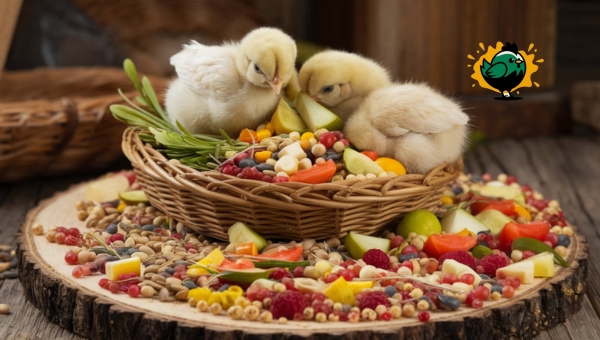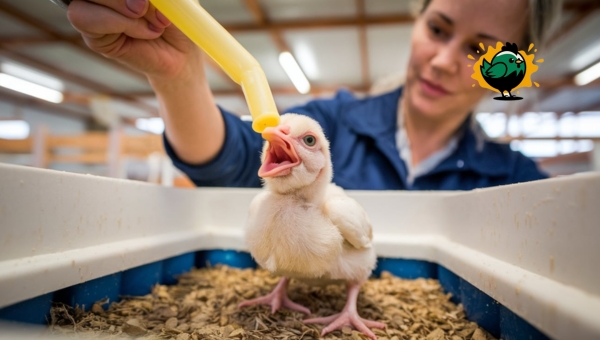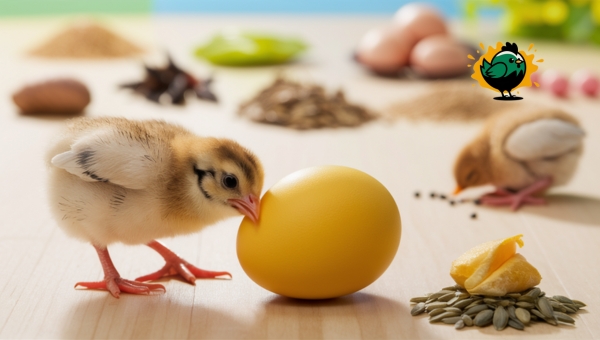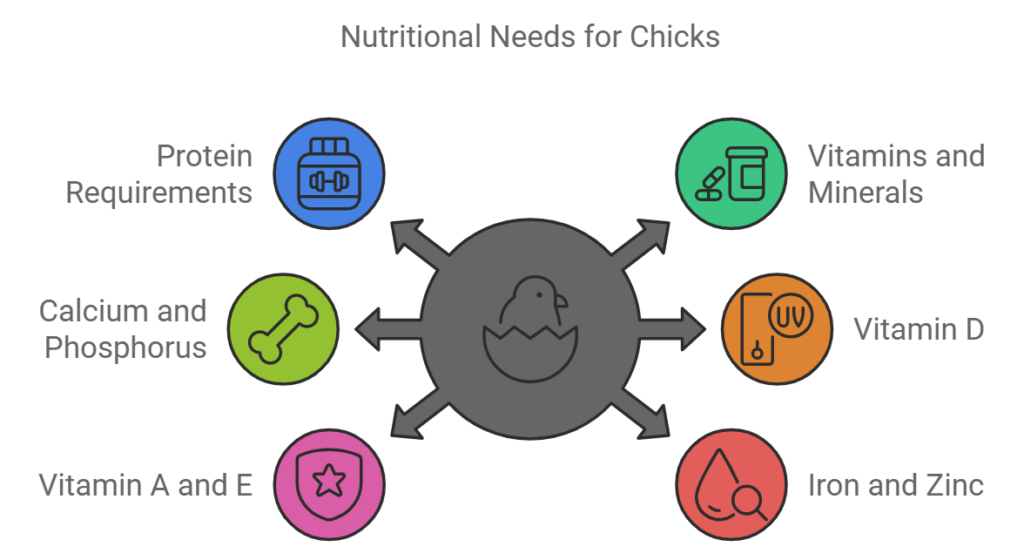Food for Newborn Chicks | Revealed the Best Nutrition

Gazing at a clutch of fluffy newborn chicks, each one bursting with potential and eager to explore their new world. As you watch them peck and scratch, a question arises: What is the best food for newborn chicks to ensure they thrive? Proper nutrition is crucial in these early days, laying the foundation for healthy development.
With the right knowledge, you can provide a balanced diet that supports their growth and vitality. In this guide, we’ll explore the essential components of chick nutrition, unveiling the secrets to raising strong and healthy birds. Let’s dive into this captivating world and unlock the best feeding practices for your chicks.
Understanding Newborn Chick Nutrition
Providing proper nutrition for newborn chicks is essential for their growth and health. Chicks require a balanced diet that meets their unique nutritional needs, especially in their early days. The foundation of chick nutrition lies in a high-protein diet, which supports rapid growth and development.

Commercial starter feeds are specifically formulated to provide the necessary nutrients, including proteins, vitamins, and minerals, ensuring chicks receive a complete diet. These feeds are designed to be easily digestible, catering to the delicate digestive systems of young chicks.
It is important to provide clean, fresh water alongside their feed to keep them hydrated and aid in their digestion. Additionally, maintaining a clean feeding environment is crucial to prevent illness. By focusing on these nutritional elements, chick owners can support the healthy development of their chicks, setting the stage for their future well-being.
Also Read: Best Food for Egg Production [Boost Your Flock’s Health]
Types of Food for Newborn Chicks
When it comes to feeding newborn chicks, selecting the right type of food is essential. You have a couple of options to ensure these little ones grow healthy and strong. Let’s explore the popular choices available for feeding newborn chicks.

Commercial Starter Feed
Commercial starter feed is a widely preferred option for feeding newborn chicks due to its balanced nutritional composition.
Here are the key benefits of using commercial starter feed:
- Nutrient-rich: Packed with essential nutrients that aid in the healthy growth of chicks.
- Convenience: Readily available in stores, providing an easy feeding solution.
- Balanced Diet: Formulated to meet the specific dietary needs of young chicks.
Homemade Chick Feed Options
For those interested in preparing feed at home, homemade options can be a suitable alternative.
Here are some considerations when choosing homemade chick feed:
- Fresh Ingredients: Allows for the use of fresh and high-quality ingredients.
- Customization: Tailor the feed to meet specific nutritional needs.
- Cost-Effective: This can be more economical than commercial feed when sourced wisely.
Essential Nutrients for Chicks
Providing the right nutrients is crucial for the healthy growth of newborn chicks. They need a balanced diet to develop strong bones, feathers, and muscles. Understanding the specific nutritional needs of chicks can help ensure they grow into healthy adult birds.

Let’s delve into the two main categories of nutrients that are vital for chicks: protein and vitamins, along with minerals.
Protein Requirements
Protein plays a key role in the growth and development of chicks. It helps in building tissues and muscles, making it an essential part of their diet.
Typically, chicks require a diet where:
- Protein content: Should be around 18-20% for optimal growth.
- Amino acids: Essential amino acids like lysine and methionine should be included to support growth and health.
- Sources: Can be obtained from chick starter feeds or supplemented with fish meal and soybean meal.
Vitamins and Minerals
Vitamins and minerals are fundamental for maintaining good health and supporting various bodily functions in chicks.
Important nutrients include:
- Calcium and Phosphorus: Essential for bone development.
- Vitamin D: Helps in calcium absorption.
- Vitamin A and E: Support immunity and cell health.
- Iron and Zinc: Important for oxygen transport and enzyme function.
Ensuring a mix of these vitamins and minerals will aid in the robust development of your chicks.
Also Read: Vitamins for Chicken – Boosting Poultry Health
Feeding Schedule and Techniques
Ensuring newborn chicks receive the right food at the right time is vital for their healthy growth and development. Establishing a proper feeding schedule is crucial as it helps meet the nutritional needs of chicks efficiently.
Additionally, employing effective feeding techniques can significantly impact the overall success of the feeding process. Let’s delve into how often you should feed your chicks and explore practical tips for achieving feeding success.
How Often to Feed?
Feeding frequency is a key factor in promoting optimal growth for newborn chicks. Chicks require constant access to food to support their rapid development, especially during the first few weeks.
Here’s a recommended feeding schedule:
- First Week: Provide feed continuously, ensuring chicks have access to it at all times.
- Second and Third Weeks: Offer feed four to five times a day to keep up with their increasing energy needs.
- After Three Weeks: Transition to feeding three times a day as their growth rate stabilizes.
Tips for Feeding Success
Implementing effective feeding strategies can make a significant difference in chick development.
Here are some practical tips to ensure success:
- Keep Feed Fresh: Regularly replace old feed to maintain nutrient quality and prevent spoilage.
- Provide Clean Water: Ensure chicks have access to fresh, clean water at all times, as hydration is essential.
- Monitor Growth: Regularly check chick weight and growth to adjust feeding as needed.
- Use Proper Feeders: Utilize feeders that prevent waste and allow easy access for small chicks.
- Observe Behavior: Watch for signs of hunger or distress to promptly address any feeding issues.
By following these guidelines, you can support the healthy growth of your chicks and set them on the path to becoming strong, thriving birds.
Common Mistakes in Chick Feeding
Feeding newborn chicks may seem simple, but there are common errors to avoid ensuring their healthy growth.
Here are some frequent mistakes:
- Overfeeding: Providing too much feed can lead to obesity, affecting their development. It is crucial to measure feed portions carefully.
- Underfeeding: On the opposite end, not supplying enough food can stunt growth and weaken chicks’ immune systems.
- Inadequate Nutrients: Ensure the feed contains essential nutrients. Lack of protein, vitamins, and minerals can hinder proper development.
- Ignoring Cleanliness: Unclean feeding areas can cause disease. Regularly clean feeders and water containers to maintain hygiene.
- Wrong Feed Type: Using feed meant for adult chickens rather than starter feed can lead to nutritional deficiencies.
By being mindful of these mistakes, chick owners can promote healthy and productive growth in their birds.
FAQs
Can I make homemade feed for my chicks?
Yes, you can make homemade feed using ingredients like grains, seeds, and cooked eggs. However, it’s crucial to ensure that the blend meets their nutritional requirements to support their development.
How often should I feed newborn chicks?
Newborn chicks should be fed multiple times a day, typically every 2-3 hours. Regular feeding helps them grow steadily and maintain their energy levels throughout the day.
What are common feeding mistakes with chicks?
Common mistakes include overfeeding, underfeeding, and not providing enough water. It’s important to monitor their intake and adjust as they grow, ensuring they always have access to fresh water.
Conclusion
Understanding the food for newborn chicks is essential for their healthy growth and development. Proper nutrition ensures that chicks grow into strong, healthy birds. It’s crucial to provide a balanced diet that includes commercial starter feeds or carefully crafted homemade options.
Meeting their nutritional needs with adequate protein, vitamins, and minerals is vital for their overall well-being. Furthermore, maintaining a suitable feeding schedule and avoiding common feeding mistakes will help your chicks thrive.
If you found this information helpful, consider exploring more informative articles on our site to continue your journey in providing the best care for your feathered friends.
